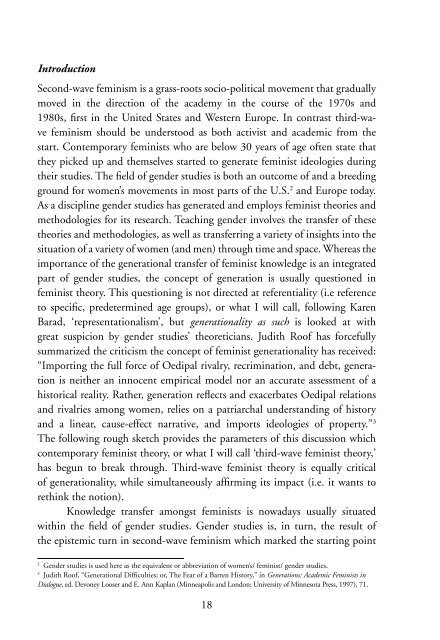Teaching with the third wave new feminists - MailChimp
Teaching with the third wave new feminists - MailChimp
Teaching with the third wave new feminists - MailChimp
You also want an ePaper? Increase the reach of your titles
YUMPU automatically turns print PDFs into web optimized ePapers that Google loves.
IntroductionSecond-<strong>wave</strong> feminism is a grass-roots socio-political movement that graduallymoved in <strong>the</strong> direction of <strong>the</strong> academy in <strong>the</strong> course of <strong>the</strong> 1970s and1980s, first in <strong>the</strong> United States and Western Europe. In contrast <strong>third</strong>-<strong>wave</strong>feminism should be understood as both activist and academic from <strong>the</strong>start. Contemporary <strong>feminists</strong> who are below 30 years of age often state that<strong>the</strong>y picked up and <strong>the</strong>mselves started to generate feminist ideologies during<strong>the</strong>ir studies. The field of gender studies is both an outcome of and a breedingground for women’s movements in most parts of <strong>the</strong> U.S. 2 and Europe today.As a discipline gender studies has generated and employs feminist <strong>the</strong>ories andmethodologies for its research. <strong>Teaching</strong> gender involves <strong>the</strong> transfer of <strong>the</strong>se<strong>the</strong>ories and methodologies, as well as transferring a variety of insights into <strong>the</strong>situation of a variety of women (and men) through time and space. Whereas <strong>the</strong>importance of <strong>the</strong> generational transfer of feminist knowledge is an integratedpart of gender studies, <strong>the</strong> concept of generation is usually questioned infeminist <strong>the</strong>ory. This questioning is not directed at referentiality (i.e referenceto specific, predetermined age groups), or what I will call, following KarenBarad, ‘representationalism’, but generationality as such is looked at <strong>with</strong>great suspicion by gender studies’ <strong>the</strong>oreticians. Judith Roof has forcefullysummarized <strong>the</strong> criticism <strong>the</strong> concept of feminist generationality has received:“Importing <strong>the</strong> full force of Oedipal rivalry, recrimination, and debt, generationis nei<strong>the</strong>r an innocent empirical model nor an accurate assessment of ahistorical reality. Ra<strong>the</strong>r, generation reflects and exacerbates Oedipal relationsand rivalries among women, relies on a patriarchal understanding of historyand a linear, cause-effect narrative, and imports ideologies of property.” 3The following rough sketch provides <strong>the</strong> parameters of this discussion whichcontemporary feminist <strong>the</strong>ory, or what I will call ‘<strong>third</strong>-<strong>wave</strong> feminist <strong>the</strong>ory,’has begun to break through. Third-<strong>wave</strong> feminist <strong>the</strong>ory is equally criticalof generationality, while simultaneously affirming its impact (i.e. it wants torethink <strong>the</strong> notion).Knowledge transfer amongst <strong>feminists</strong> is nowadays usually situated<strong>with</strong>in <strong>the</strong> field of gender studies. Gender studies is, in turn, <strong>the</strong> result of<strong>the</strong> epistemic turn in second-<strong>wave</strong> feminism which marked <strong>the</strong> starting point2Gender studies is used here as <strong>the</strong> equivalent or abbreviation of women’s/ feminist/ gender studies.3Judith Roof, “Generational Difficulties; or, The Fear of a Barren History,” in Generations: Academic Feminists inDialogue, ed. Devoney Looser and E. Ann Kaplan (Minneapolis and London: University of Minnesota Press, 1997), 71.18
















